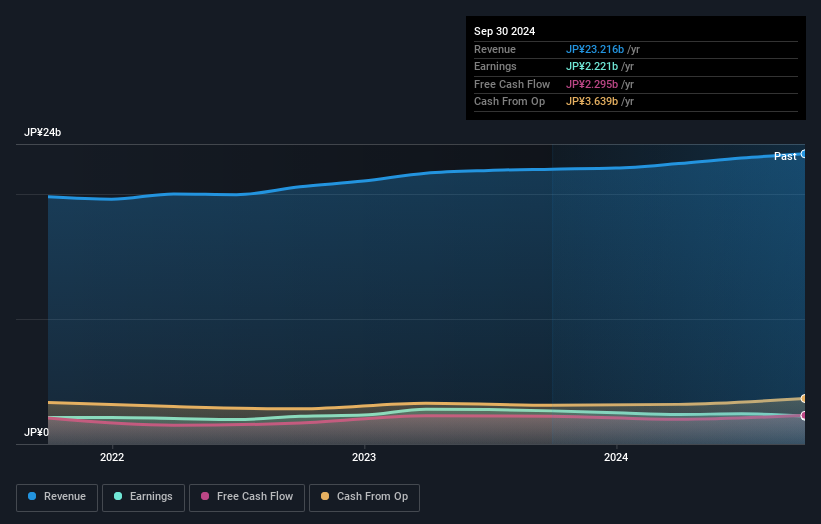- Japan
- /
- Consumer Services
- /
- TSE:9628
Institutions profited after SAN Holdings, Inc.'s (TSE:9628) market cap rose JP¥4.2b last week but individual investors profited the most

Key Insights
- SAN Holdings' significant individual investors ownership suggests that the key decisions are influenced by shareholders from the larger public
- The top 10 shareholders own 50% of the company
- Insider ownership in SAN Holdings is 21%
Every investor in SAN Holdings, Inc. (TSE:9628) should be aware of the most powerful shareholder groups. With 40% stake, individual investors possess the maximum shares in the company. That is, the group stands to benefit the most if the stock rises (or lose the most if there is a downturn).
While individual investors were the group that benefitted the most from last week’s JP¥4.2b market cap gain, institutions too had a 35% share in those profits.
Let's delve deeper into each type of owner of SAN Holdings, beginning with the chart below.
View our latest analysis for SAN Holdings

What Does The Institutional Ownership Tell Us About SAN Holdings?
Many institutions measure their performance against an index that approximates the local market. So they usually pay more attention to companies that are included in major indices.
As you can see, institutional investors have a fair amount of stake in SAN Holdings. This implies the analysts working for those institutions have looked at the stock and they like it. But just like anyone else, they could be wrong. When multiple institutions own a stock, there's always a risk that they are in a 'crowded trade'. When such a trade goes wrong, multiple parties may compete to sell stock fast. This risk is higher in a company without a history of growth. You can see SAN Holdings' historic earnings and revenue below, but keep in mind there's always more to the story.

SAN Holdings is not owned by hedge funds. Looking at our data, we can see that the largest shareholder is Dimensional Fund Advisors LP with 20% of shares outstanding. With 5.5% and 4.5% of the shares outstanding respectively, Ginsen Co., Ltd., Asset Management Arm and Koekisha-Kyoto Co.,Ltd. are the second and third largest shareholders. In addition, we found that Satoshi Harishima, the CEO has 1.8% of the shares allocated to their name.
We did some more digging and found that 10 of the top shareholders account for roughly 50% of the register, implying that along with larger shareholders, there are a few smaller shareholders, thereby balancing out each others interests somewhat.
Researching institutional ownership is a good way to gauge and filter a stock's expected performance. The same can be achieved by studying analyst sentiments. Our information suggests that there isn't any analyst coverage of the stock, so it is probably little known.
Insider Ownership Of SAN Holdings
While the precise definition of an insider can be subjective, almost everyone considers board members to be insiders. Company management run the business, but the CEO will answer to the board, even if he or she is a member of it.
I generally consider insider ownership to be a good thing. However, on some occasions it makes it more difficult for other shareholders to hold the board accountable for decisions.
It seems insiders own a significant proportion of SAN Holdings, Inc.. It has a market capitalization of just JP¥25b, and insiders have JP¥5.2b worth of shares in their own names. This may suggest that the founders still own a lot of shares. You can click here to see if they have been buying or selling.
General Public Ownership
The general public, who are usually individual investors, hold a 40% stake in SAN Holdings. This size of ownership, while considerable, may not be enough to change company policy if the decision is not in sync with other large shareholders.
Private Company Ownership
Our data indicates that Private Companies hold 4.5%, of the company's shares. Private companies may be related parties. Sometimes insiders have an interest in a public company through a holding in a private company, rather than in their own capacity as an individual. While it's hard to draw any broad stroke conclusions, it is worth noting as an area for further research.
Next Steps:
I find it very interesting to look at who exactly owns a company. But to truly gain insight, we need to consider other information, too.
Many find it useful to take an in depth look at how a company has performed in the past. You can access this detailed graph of past earnings, revenue and cash flow.
If you would prefer check out another company -- one with potentially superior financials -- then do not miss this free list of interesting companies, backed by strong financial data.
NB: Figures in this article are calculated using data from the last twelve months, which refer to the 12-month period ending on the last date of the month the financial statement is dated. This may not be consistent with full year annual report figures.
New: Manage All Your Stock Portfolios in One Place
We've created the ultimate portfolio companion for stock investors, and it's free.
• Connect an unlimited number of Portfolios and see your total in one currency
• Be alerted to new Warning Signs or Risks via email or mobile
• Track the Fair Value of your stocks
Have feedback on this article? Concerned about the content? Get in touch with us directly. Alternatively, email editorial-team (at) simplywallst.com.
This article by Simply Wall St is general in nature. We provide commentary based on historical data and analyst forecasts only using an unbiased methodology and our articles are not intended to be financial advice. It does not constitute a recommendation to buy or sell any stock, and does not take account of your objectives, or your financial situation. We aim to bring you long-term focused analysis driven by fundamental data. Note that our analysis may not factor in the latest price-sensitive company announcements or qualitative material. Simply Wall St has no position in any stocks mentioned.
About TSE:9628
Established dividend payer and good value.
Market Insights
Community Narratives




